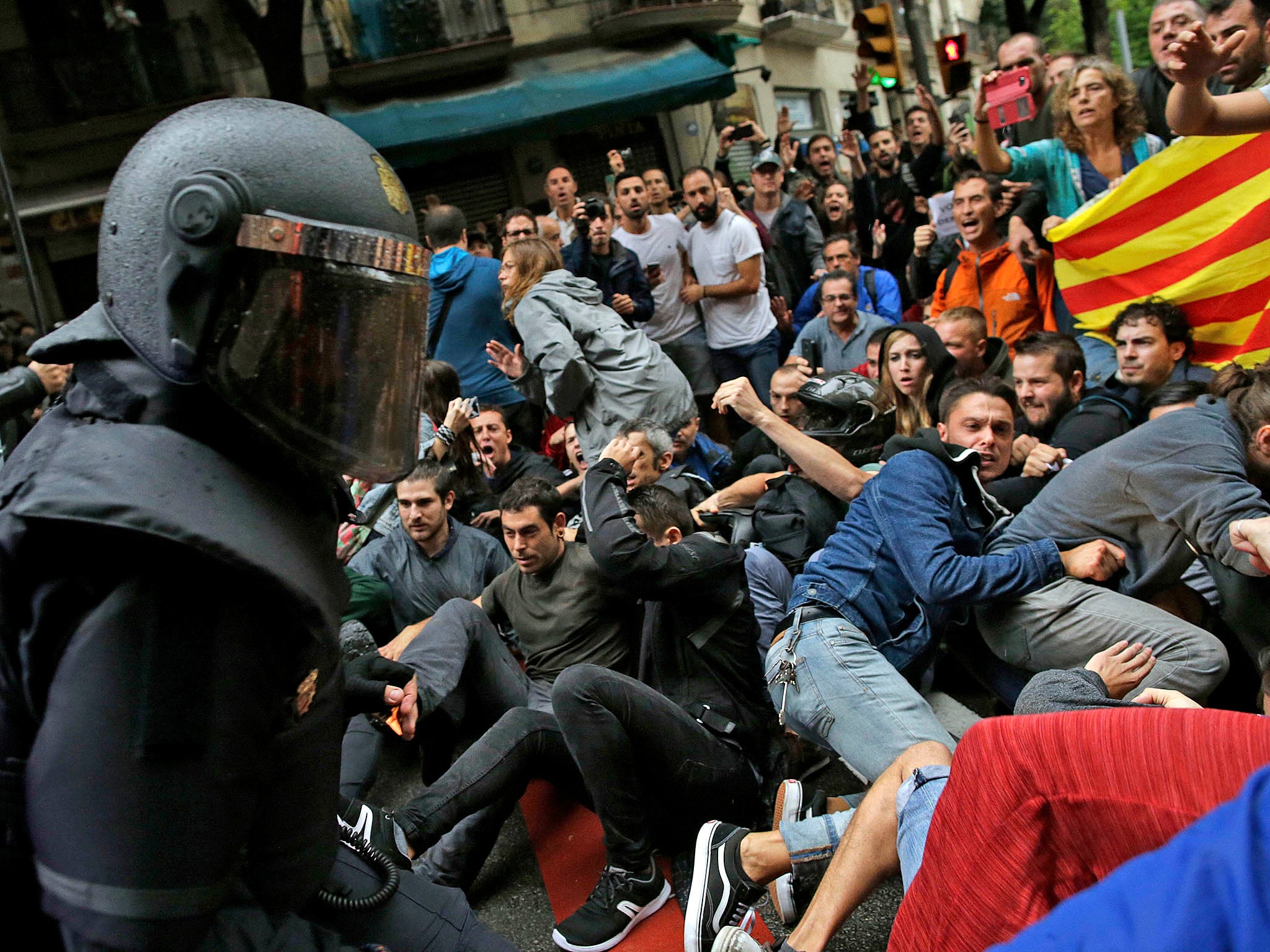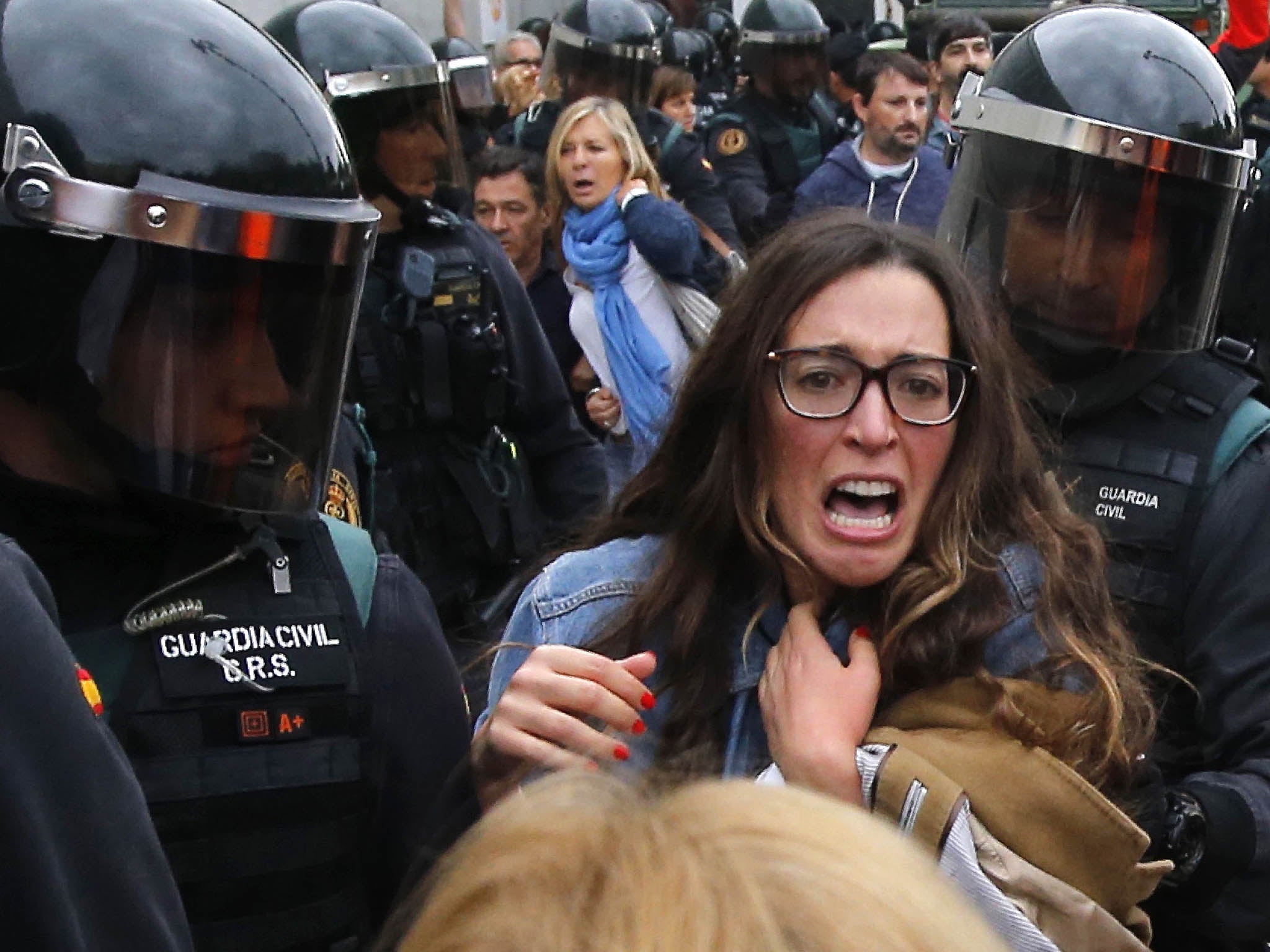Catalan independence referendum: ‘844 injured in clashes with police’, says regional government
Riot police fired rubber bullets into crowds and hit people with batons as they tried to stop the vote

Your support helps us to tell the story
From reproductive rights to climate change to Big Tech, The Independent is on the ground when the story is developing. Whether it's investigating the financials of Elon Musk's pro-Trump PAC or producing our latest documentary, 'The A Word', which shines a light on the American women fighting for reproductive rights, we know how important it is to parse out the facts from the messaging.
At such a critical moment in US history, we need reporters on the ground. Your donation allows us to keep sending journalists to speak to both sides of the story.
The Independent is trusted by Americans across the entire political spectrum. And unlike many other quality news outlets, we choose not to lock Americans out of our reporting and analysis with paywalls. We believe quality journalism should be available to everyone, paid for by those who can afford it.
Your support makes all the difference.Catalonia's regional government has said the number of people injured in the polling day violence has risen to 844 after police fired rubber bullets and beat people trying to vote.
The Spanish Civil Guard was seen hitting people with batons, fired rubber bullets into crowds and forcibly removed would-be voters from polling stations in actions that were condemned internationally but were described by the government as "proportionate".
The referendum, declared illegal by Spain's central government, has thrown the country into its worst constitutional crisis in decades and deepened a centuries-old rift between Madrid and Barcelona.
Catalonia has agitated for greater independence for centuries but the secession campaign received new impetus during the financial crisis when the wealthy region came to feel it was supporting the rest of the country.
The autonomous Catalan government first held a non-binding referendum in 2014 on independence in which 80 per cent expressed support.
This fresh vote was called in June this year with a separate law passed by the Catalan parliament which said the referendum would be binding based on a simple majority without a minimum threshold.
Opposition parties in Barcelona protested against the law and have called on supporters to boycott the vote.
The national government called the move a “constitutional and democratic atrocity” and said it was invalid because it did not have the support of two thirds of the Catalan parliament – the threshold needed to pass laws on constitutional matters.
Last month, the Constitutional Court in Madrid ruled that the referendum was illegal because it violated a clause in the constitution which refers to "the indissoluble unity of the Spanish nation, the common and indivisible homeland of all Spaniards".
The Catalan government says Spain is "the shame of Europe" for the way it has cracked down on the region's bid to hold a secession referendum
Government spokesman Jordi Turull says "what the police are doing is simply savage, it's an international scandal."
Barcelona’s mayor, Ada Colau, has called on Spanish Prime Minister Mariano Rajoy to resign over the violence.
She told TV3 that "Rajoy has been a coward, hiding behind the prosecutors and courts. Today he crossed all the red lines with the police actions against normal people, old people, families who were defending their fundamental rights."
She adds that "It seems obvious to me that Mariano Rajoy should resign."
Several international commentators, including former Greek finance minister Yanis Varoufakis, have echoed a comment made by Catalan President Carles Puigdemont comparing Mr Rajoy’s conduct to General Francisco Franco who brutally surprised Catalonia at the end of the Spanish Civil War in 1939.
But Mr Rajoy has remained defiant saying “there was no independence referendum today”.
In an address to television cameras, he said the people of Catalonia had been tricked into taking part in the illegal vote.

He accused the regional government of using the referendum as a strategy against legality and democratic harmony and was a “path that leads to nowhere”.
He praised the Civil Guard and the security services for upholding the law.
The government had hoped to avoid the vote fearing it would cause a constitutional crisis but has caused one regardless by its heavy-handed response.
Solidarity demonstrations have already taken place in other Spanish cities such as Seville and trade union officials in Catalonia have called for a general strike.
Additional reporting by agencies
Join our commenting forum
Join thought-provoking conversations, follow other Independent readers and see their replies
Comments